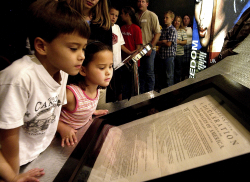Husbands, love your wives, wives love your husbands, as Christ loved the Church and gave himself up for her . . . because we are members of his body. For this reason a man shall leave his father and mother and be joined to his wife, and the two shall become one flesh. This is a great mystery, and I mean in reference to Christ and the Church. (Cf. Eph. 5:25, 30-32)
This great mystery is Jesus Christ, the Bridegroom, leaving His Father in heaven and His mother on earth to unite Himself to His Bride, the Church, in the Eucharist—body, blood, soul, and divinity. Make no mistake about it, when all the smoke and fog clears, the great desire of the human heart to love and be loved, and to enter into marriage, point directly to the Eucharist and Christ’s desire to be one flesh with us.
Marriage and the family, thus united to Christ and the Church, form two of the three “necessary societies” (that is, societies necessary for human happiness). From this foundation, you are called to “go out and labor in the vineyard,” to go out and build a culture of truth, love, life, and liberty. Polity (politics, the state, or civil society), an aspect of this “going out,” is the third necessary society. This is your Christian Inheritance.
All throughout, Christ calls you to become one with Him, forging you into men of courage, purpose, and unshakable faith. So while living in these societies, you are called to stand as warriors for Christ, rebuilding the crumbling foundations of a decaying civilization into one rooted in truth, love, and liberty.
The concept of “homeland” comes to mind soon after the concept of “family,” for they go hand in hand. As you experience social bonding that extends beyond the family, you also begin to share in responsibility for the common good of that society. This is our homeland. The social bond then extends to the prominent figures of the society’s history, ancient or modern, it informs education, and fosters further development of that social love into something more often called “love of country” (Cf. Pope John Paul II, Dilecti Amici, No. 11). In this way, the family inheritance grows wider.
Families, societies, and countries unite in a shared culture and a shared history. So the family bond means at the same time membership in a wider community as well as a basis of personal identity. If the family is the first teacher, then, in some sense, you are also taught by the tribe, people, or nation with which you are linked through the unity of culture, language, and history (Dilecti Amici, No. 11).
This inheritance likewise constitutes a call in the ethical sense. By receiving and inheriting faith and the values and elements that make up the culture of your society and the history of your nation, each of us is spiritually endowed in our individual humanity.
Here we turn to the parable of the talents—the talents which we receive from the Creator through our parents and families, and also through the national community to which we belong. In regard to this inheritance, we cannot maintain a passive attitude, still less a defeatist one, as did the last of the servants described in the parable.
Today, there’s a sense an urgency to use your talents to do everything you can to accept this spiritual inheritance, to confirm it, maintain it, increase it (Dilecti Amici, No. 11), and share it with your brothers and sisters. For you know, even in your own families, that too many of our young people are taken up in the present culture of death and are being lost to the spirit of the age, to the principalities and the powers, and the world rulers of this present darkness. In a world that mocks marriage, profanes the sacred, and erodes just governance, you are summoned to “go out and labor in the vineyard” (cf. Mt 20:1–16), wielding the strength of Christ to rebuild what has been torn down.
The three necessary societies as framed by Pope Leo XIII are all under siege. Today the culture of death—abortion, pornography, gender ideologies, and the disintegration of the family—targets your generation with ruthless precision. It seduces you with instant gratification, isolates you in digital echo chambers, and undermines your vocation to be husbands, fathers, and leaders. Abortion claims millions of lives, robbing you of brothers and sisters. Pornography warps your understanding of love, turning women into objects and men into slaves. Gender ideologies sow confusion, attacking the very meaning of masculinity. Following Leo, Pope Pius XI stated, “a demise of the necessary societies would mark a social calamity.” The stakes are high, and the battle is yours to fight.
It would take the vision of John Paul II to build further upon what had been handed down to him by his papal predecessors to tackle these seemingly insurmountable problems of the day—namely, by returning to the basics: that it is only in the Person of Jesus Christ (Redemptor Hominis) that humanity will encounter a force strong enough to defeat the modern evils of the day.
He challenged young people to lead a “revolution of conscience,” calling you to live with integrity, defend human dignity, and embrace true freedom by rejecting sin—especially the sins of lust, pride, and apathy that ensnare so many. Lust reduces love to self-gratification. Pride blinds you to your need for God. Apathy surrenders the battlefield without a fight. This revolution demands that you break free from these chains, becoming men who love boldly, serve humbly, and fight courageously.
This is a war between the culture of life and the culture of death, between those who work to rebuild family, Church, and society and those who seek their destruction. It’s a battle of good versus evil, truth versus lies, and sacrificial love versus self-indulgence. No politician or movement will ride in on a white horse to save the day. The root problem isn’t climate change, economic strife, or even societal decay—it’s sin. And the solution lies in your heart, united to Christ in the Eucharist.
You, young men, are the heroes of this fight. As St. Catherine of Siena declared, “Become who you are, and you will set the world on fire.” Your strength, united as one body in Christ, can ignite a culture of life that protects the unborn, defends children from exploitation, and upholds the truth that every child deserves a mother and father. This culture calls you to be protectors, not predators; to love your neighbor; and to lead with courage, not cowardice. It’s a culture where you stand firm against the tide of moral relativism, proclaiming the Truth of the Gospel with your words and your lives.
Is this possible in a fallen world? Yes—when you unite your “Fiat,” your yes, to the great “I AM” and heed Christ’s warning and promise: “The thief comes only to steal and kill and destroy; I came that they may have life and have it abundantly” (Jn. 10:10).
Since the Fall, man has misused his freedom, chasing goals apart from God. Today, technological power and moral confusion threaten humanity itself, as men prioritize self-interest over the common good. Social media amplifies division, pornography fuels isolation, and materialism dulls the soul. Yet God counters the mysterium iniquitatis (“the mystery of evil”) with the mysterium pietatis (“the mystery of redemption”). Through Christ’s sacrifice, Adam’s disobedience is undone (Rom. 5:19).
The Eucharist is your strength, young men. In it, Christ offers Himself to the Father for your salvation, inviting you to share in His sacrifice. Every time you receive the Eucharist, you are fortified to fight the battles of your heart—whether it’s resisting temptation, standing up for truth at work, or preparing to lead a family with fidelity.
This sacrifice is so decisive for the salvation of the human race that Jesus Christ offered it and returned to the Father only after He had left us a means of sharing in it as if we had been present there. What more could Jesus have done for us? Truly, in the Eucharist, He shows us a love which goes “to the end” (c. Jn. 13:1), a love which knows no measure (Ecclesia De Eucharistia, No. 11).
In instituting the Eucharist, He did not merely say: “This is my body,” “this is my blood,” but went on to add: “. . . which is given for you,” “. . . which is poured out for you” (Lk. 22:19-20). Jesus did not stop when He stated that what He was giving them to eat and drink was His body and blood; He also expressed its sacrificial meaning and made sacramentally present His sacrifice which would soon be offered on the Cross for the salvation of all. “The Mass is at the same time, and inseparably, the sacrificial memorial in which the sacrifice of the Cross is perpetuated and the sacred banquet of communion with the Lord’s Body and Blood” (Ecclesia De Eucharistia, No. 12; CCC 1382).
So, young men, fight for your family, homeland, and polity—the three necessary societies—as Christ calls you to, leaning on His strength provided to us in the Eucharist and His example of unending sacrificial love.
Author’s Note: This week, connect with a Claymore Disciple, or invite a friend, to share your journey—you’re stronger together. Download the Claymore, Milites Christi Blueprint here and review the Discussion Questions together!
Claymore is a discipleship movement for courageous individuals, especially young men, committed to reclaiming their freedom and territory for Christ, by fostering a culture of life, liberty, and authentic love.
Image from Wikimedia Commons
















